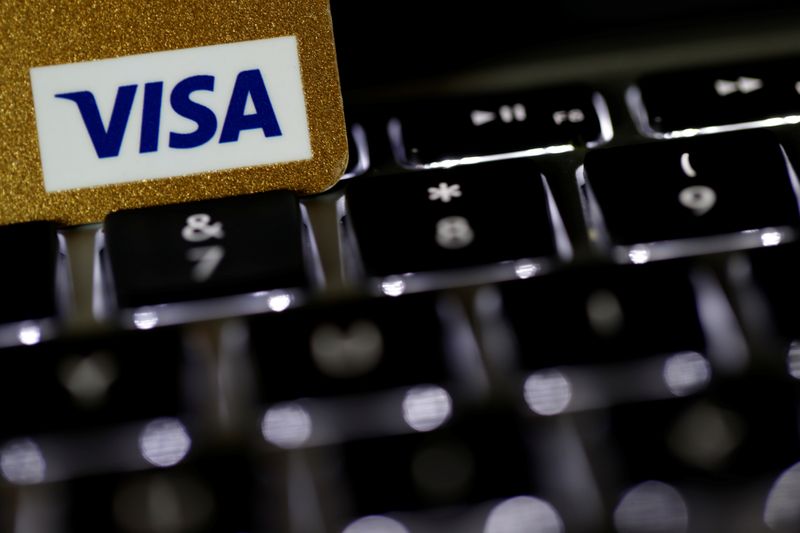By Lewis Krauskopf
NEW YORK (Reuters) - Tech and internet titans were the first to reach $1 trillion (760.80 billion pounds) in stock market value, but the next U.S. companies that could do so are better known for their plastic.
Soaring stock prices are propelling credit and debit card companies Visa Inc (N:V) and Mastercard Inc (N:MA) up the market value charts, where they currently rank 7th and 11th among companies in the benchmark S&P 500 (SPX) index. The stock prices of both Visa and Mastercard have gained roughly 50% in the past year. While the stocks may not keep up that torrid pace, Visa and Mastercard would each be worth over $1 trillion by 2023 if their average annual gains of the past three years were to continue, surging past the likes of Facebook Inc (O:FB) and Berkshire Hathaway Inc (N:BRKa), if they also maintain their recent pace.
Fueling their rise is a shift toward cashless financial transactions spurred by a rise in online shopping.
"Everything travels on their rails," said Sandy Villere, portfolio manager of the Villere Balanced Fund, which holds Visa shares. "They literally sit in the middle of the banks, consumers and merchants and that has been a really enviable place to be."
Visa had a market value of $449 billion and Mastercard's stood at about $324 billion as of Thursday's close. The $1 trillion club currently includes Apple Inc (O:AAPL), Microsoft (O:MSFT) and Google-parent Alphabet (O:GOOGL).
Amazon.com (O:AMZN) stood at $927 billion, though the e-commerce leader's shares jumped on the heels of its earnings report on Thursday after the bell, putting it in position to crack $1 trillion, as it did briefly in September 2018.
(GRAPHIC: Top U.S. market cap companies - https://fingfx.thomsonreuters.com/gfx/editorcharts/USA-STOCKS/0H001R88DBP0/eikon.png)
Revenue for both Visa and Mastercard nearly doubled over their past five fiscal years, to nearly $23 billion for Visa, and about $17 billion for Mastercard, according to Refinitiv data. Adjusted earnings per share more than doubled for both companies over that period.
Visa reported quarterly revenue late on Thursday that slightly missed analyst estimates, a day after Mastercard beat quarterly profit estimates.
About 43% of consumer purchases around the world excluding China are made using a digital form of payment, up from 28% in 2010, according to Lisa Ellis, senior analyst at MoffettNathanson.
“Globally, we still have five to 10 years, at least, to go of penetration,” Ellis said.
Visa holds a 60% share of the credit and debit card market, followed by Mastercard with 30%, according to Ellis, with American Express (N:AXP) far behind at 8.5%.
Despite their importance in finance, Visa and Mastercard are categorized as part of the S&P 500's information technology sector (SPLRCT). While Apple, Microsoft and chip companies such as Intel Corp (O:INTC) often garner the lion's share of attention, Visa and Mastercard have been key contributors to the rally in technology shares. Their valuations have expanded to their most expensive in at least a decade. Visa trades at about 31 times forward 12 months' earnings estimates, while Mastercard trades at 35 times, according to Refinitiv Datastream. Both stocks are trading at a higher premium to the market than they have on average over the past five years.
The big run for Visa and Mastercard shares has also come during an more than 10-year U.S. bull market, and gains could be more muted in any downturn. Stocks started 2020 strong but have pulled back amid concerns over the spread of a virus from China.
(GRAPHIC: Visa, Mastercard soaring shares - https://fingfx.thomsonreuters.com/gfx/mkt/13/1606/1581/Pasted%20Image.jpg)
Risks to the companies, Ellis said, include greater competition in the payment sector from big tech companies, as well as tougher regulations from governments around the world that might hinder access.

The companies are not sitting still. Earlier this month, Visa agreed to buy privately held Plaid Inc in a $5.3 billion deal to boost access to financial technology, and in August Mastercard agreed to buy a majority of the corporate services businesses of Scandinavian payments group Nets for about $3.19 billion.